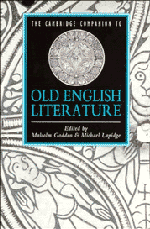Book contents
- Frontmatter
- 1 Anglo-Saxon society and its literature
- 2 The Old English language
- 3 The nature of Old English verse
- 4 The nature of Old English prose
- 5 Germanic legend in Old English literature
- 6 Heroic values and Christian ethics
- 7 Pagan survivals and popular belief
- 8 Beowulf
- 9 Fatalism and the millennium
- 10 Perceptions of transience
- 11 Perceptions of eternity
- 12 Biblical literature
- 13 Biblical literature
- 14 The saintly life in Anglo-Saxon England
- 15 The world of Anglo-Saxon learning
- Further reading
- Index
- Series List
6 - Heroic values and Christian ethics
Published online by Cambridge University Press: 28 May 2006
- Frontmatter
- 1 Anglo-Saxon society and its literature
- 2 The Old English language
- 3 The nature of Old English verse
- 4 The nature of Old English prose
- 5 Germanic legend in Old English literature
- 6 Heroic values and Christian ethics
- 7 Pagan survivals and popular belief
- 8 Beowulf
- 9 Fatalism and the millennium
- 10 Perceptions of transience
- 11 Perceptions of eternity
- 12 Biblical literature
- 13 Biblical literature
- 14 The saintly life in Anglo-Saxon England
- 15 The world of Anglo-Saxon learning
- Further reading
- Index
- Series List
Summary
In an image of compelling sadness, the Wanderer evokes the life of a lordless man. Cold and alone, he can do nothing but remember the joys of the past-companions in the hall, the giving of treasure and the favour of his lord. Not even sleep brings forgetfulness:
Forϸon wat se ϸe sceal his winedryhtnes leofes larcwidum longe forϸolian, ðonne sorg ond slæp somod ætgædre earmne anhogan oft gebindað. Pinceð him on mode ϸæt he his mondryhten clyppe ond cysse, ond on cneo lecge honda ond heafod, swa he hwilum ær in geardagum giefstolas breac (The Wanderer 37-44)
Indeed, this he knows, who must long be deprived of the counsels of his beloved lord, when sorrow and sleep together often bind the wretched solitary one. It seems to him in his mind that he embraces and kisses his lord and lays hands and head on his knee, as he had previously, from time to time in days gone by, gained benefit from the throne.
Sleeping, the lordless man dreams of what he longs for most, the life of a retainer, here represented by synecdoche in the act of homage and the giving of treasure. To lack a lord is to lack place and role, friend and kin, help in need, and vengeance after death. The Wanderer's misery, having no remedy in this world, is balanced by the astringent comfort of the next. But even the Wanderer's final spiritual rejection of the world is figured in a lovingly detailed enumeration of its heroic joys: horse, kinsman, giftgiving, feasting, hall-joys, treasure, warriors and lord (The Wanderer 92-5).
- Type
- Chapter
- Information
- The Cambridge Companion to Old English Literature , pp. 107 - 125Publisher: Cambridge University PressPrint publication year: 1991
- 5
- Cited by



